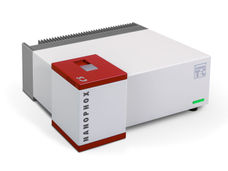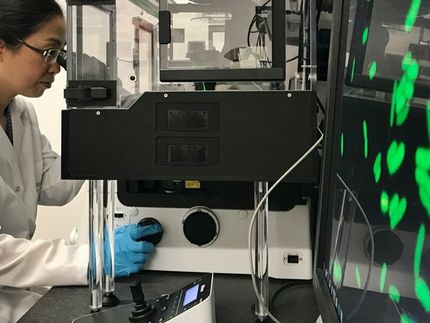Argonne, University of Chicago scientists develop targeted cancer treatment using nanomaterials
Nano-bio material kills cancer cells, leaves healthy cells in unharmed
Scientists from the U.S. Department of Energy's (DOE) Argonne National Laboratory and the University of Chicago's Brain Tumor Center have developed a way to target brain cancer cells using inorganic titanium dioxide nanoparticles bonded to soft biological material. Thousands of people die from malignant brain tumors every year, and the tumors are resistant to conventional therapies. This nano-bio technology may eventually provide an alternative form of therapy that targets only cancer cells and does not affect normal living tissue.
"It is a real example of how nano and biological interfacing can be used for biomedical application," said scientist Elena Rozhkova with Argonne's Center for Nanoscale Materials. "We chose brain cancer because of its difficulty in treatment and its unique receptors."
This new therapy relies on a two-pronged approach. Titanium dioxide is a versatile photoreactive nanomaterial that can be bonded with biomolecules. When linked to an antibody nanoparticles recognize and bind specifically to cancer cells. Focused visible light is shined onto the affected region, and the localized titanium dioxide reacts to the light by creating free oxygen radicals that interact with the mitochondria in the cancer cells. Mitochondria act as cellular energy plants, and when free radicals interfere with their biochemical pathways, mitochondria receive a signal to start cell death.
X-ray fluorescence microscopy done at Argonne's Advanced Photon Source also showed that the tumors' invadopodia, actin-rich micron scale protrusions that allow the cancer to invade surrounding healthy cells, can be also attacked by the titanium dioxide.
So far, tests have been done only on cells in a laboratory setting, but animal testing is planned for the next phase. Results show an almost 100 percent cancer cell toxicity rate after six hours of illumination, and 80 percent after 48 hours.
Also, since the antibody only targets the cancer cells, surrounding healthy cells are not affected, unlike other cancer treatments such as chemotherapy and radiotherapy. Rozhkova said that a proof of concept is demonstrated, and other cancers can be treated as well using different targeting molecules, but research is in the early stages.
Other news from the department science
These products might interest you

NANOPHOX CS by Sympatec
Particle size analysis in the nano range: Analyzing high concentrations with ease
Reliable results without time-consuming sample preparation

Eclipse by Wyatt Technology
FFF-MALS system for separation and characterization of macromolecules and nanoparticles
The latest and most innovative FFF system designed for highest usability, robustness and data quality

DynaPro Plate Reader III by Wyatt Technology
Screening of biopharmaceuticals and proteins with high-throughput dynamic light scattering (DLS)
Efficiently characterize your sample quality and stability from lead discovery to quality control

Get the chemical industry in your inbox
By submitting this form you agree that LUMITOS AG will send you the newsletter(s) selected above by email. Your data will not be passed on to third parties. Your data will be stored and processed in accordance with our data protection regulations. LUMITOS may contact you by email for the purpose of advertising or market and opinion surveys. You can revoke your consent at any time without giving reasons to LUMITOS AG, Ernst-Augustin-Str. 2, 12489 Berlin, Germany or by e-mail at revoke@lumitos.com with effect for the future. In addition, each email contains a link to unsubscribe from the corresponding newsletter.



























































